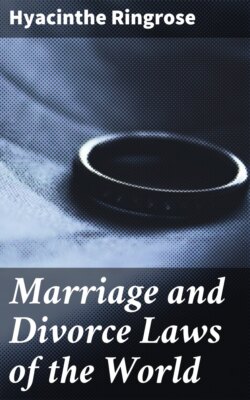Читать книгу Marriage and Divorce Laws of the World - Hyacinthe Ringrose - Страница 8
На сайте Литреса книга снята с продажи.
CHAPTER IV.
ОглавлениеTable of Contents
Ireland.
Ireland like Scotland has its separate judicial system, and many of its laws differ from those of all other parts of the British Empire.
The Irish law relating to marriage and matrimonial controversies is administered under the Matrimonial Causes and Marriage Law (Ireland) Amendment Act of 1870. It is practically the same as the English law as it existed before 1857.
The Irish Act of 1870 transferred the exercise by the Ecclesiastical Courts prior to the disestablishment of the Church of Ireland to a court for matrimonial causes and assigned the trial of such causes to the judge of the Court of Probate.
Under the Irish Judicature Act of 1877 this jurisdiction is now vested in the Supreme Court of Judicature and is exercised by the probate and matrimonial judge.
It is impossible to obtain a decree of divorce from the bonds of matrimony in the courts of Ireland. The only divorce decree granted is from bed and board, and amounts in effect to what is termed a judicial separation in England.
The grounds for the limited form of divorce granted by the courts are adultery, cruelty or unnatural practices.
In order to obtain a decree of complete divorce the petitioner must promote a bill in the House of Lords to dissolve the marriage and allow the petitioner to marry again, which bill must be founded upon and follow a divorce from bed and board obtained in the Irish courts.
When a petition is presented to the House of Lords a wife must prove her husband’s adultery coupled with cruelty and a husband must prove his wife’s adultery and must, if possible, make his wife’s paramour a party by instituting proceedings against him for criminal conversation in the Irish courts.
Nullity.—An action for nullity of marriage can be maintained on the following grounds: 1. Impuberty. 2. Relationship of the parties within the prohibited degrees. 3. An existing prior marriage of one of the parties. 4. Incapacity of the parties to conclude the marriage contract, as in the event of one being a lunatic. 5. Non-compliance with marriage laws. 6. Fraud in procuring the marriage. 7. Impotency.
